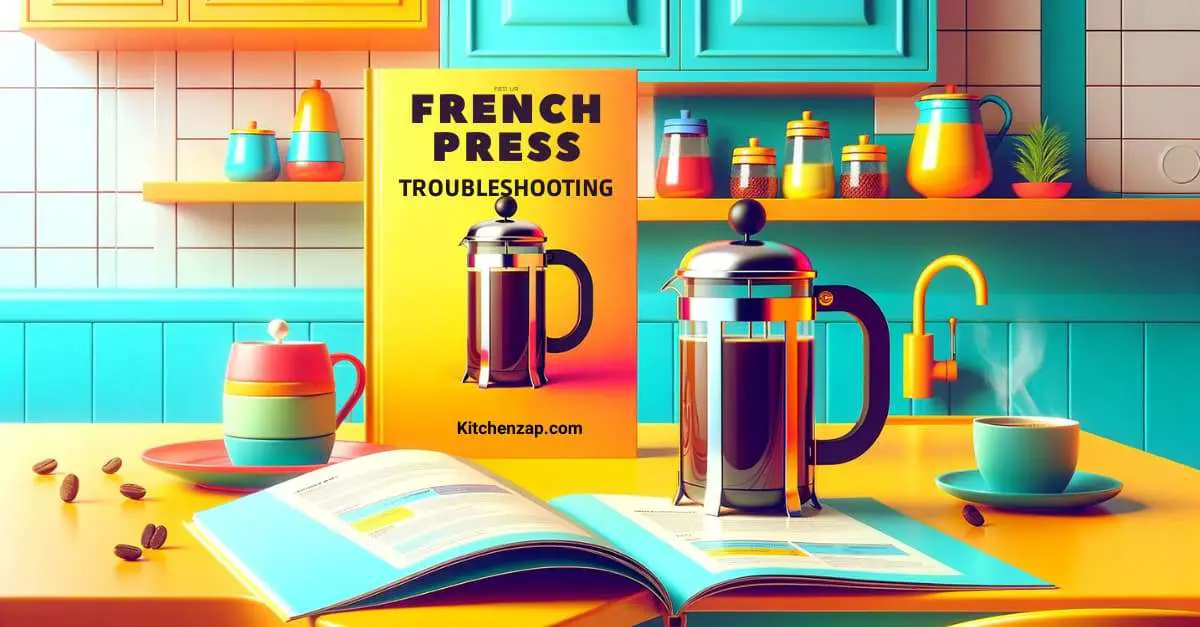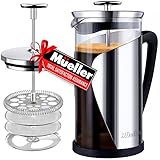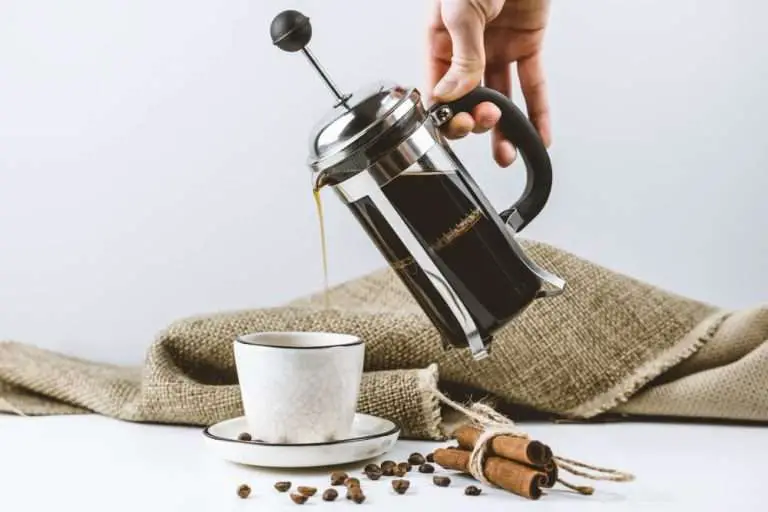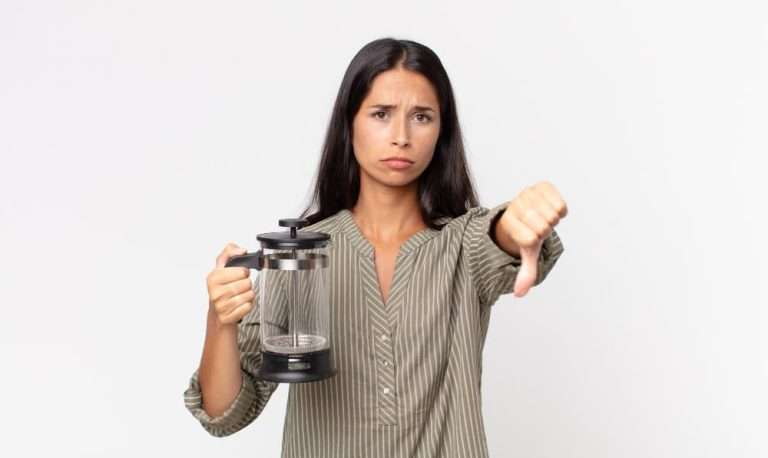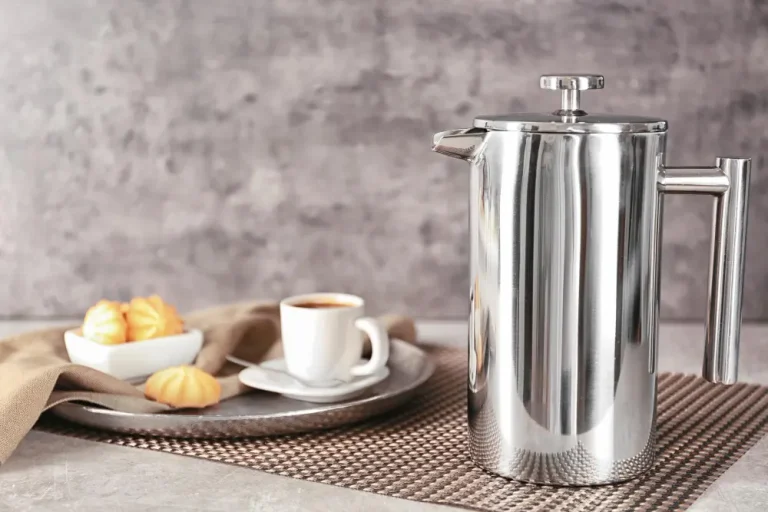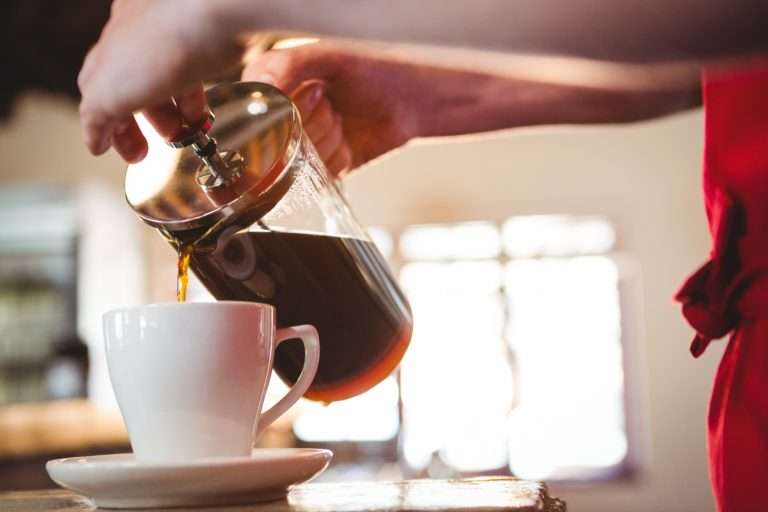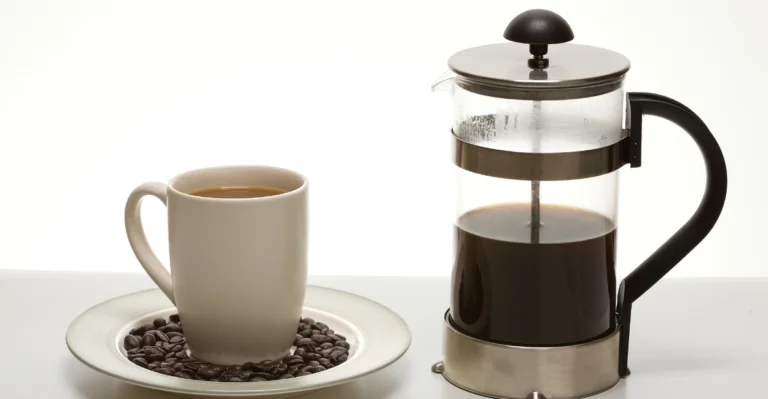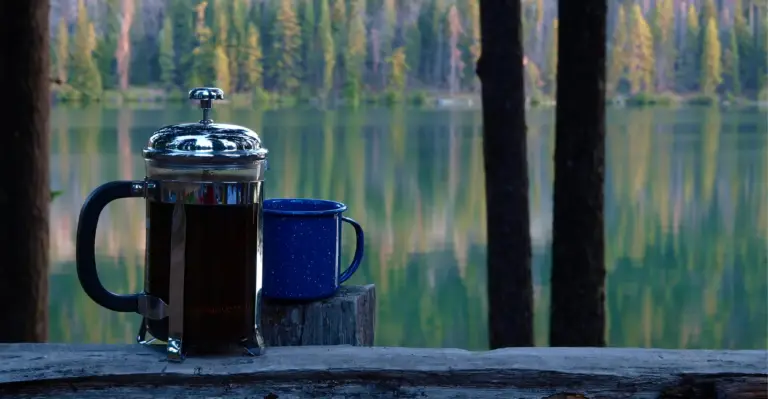Brew Like a Pro: Essential French Press Coffee Troubleshooting for 29 Common Issues
Mastering French Press Coffee Troubleshooting doesn’t have to be complicated. The French press makes coffee by mixing hot water and coarse coffee grounds. Then you press down a screen to filter it.
It’s a very simple machine. But that means you can mess up the brew if you’re not careful.
We’ll walk you through the 29 most common problems of brewing French press coffee. Follow along to become an expert at diagnosing issues and making your coffee just how you love it.
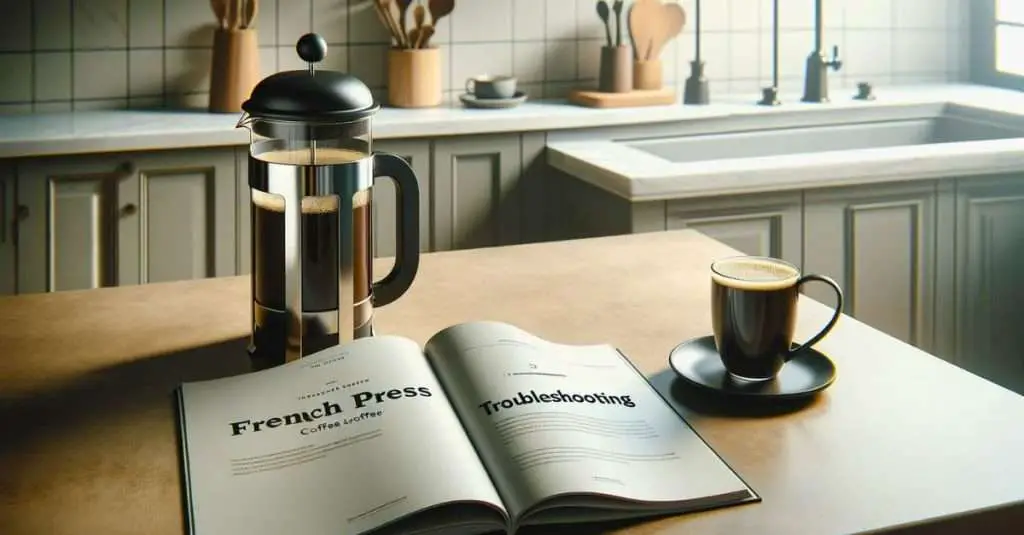
1. what temperature to heat water for french press?
| Temperature | Effect | Tips |
| Too hot (205°F+) | • Scorches grounds • Bitter, astringent flavor | • Allow boiled water to sit 30-60 seconds before pouring • Use thermometer to check temp |
| Too cold (under 195°F) | • Under extracts coffee oils and solids • Weak, flavorless coffee | • Make sure kettle is heating to a full boil • Pre-heat press with hot water while kettle heats |
Proper water temperature for french press is crucial when brewing French press coffee.
The water needs to be hot enough to thoroughly extract flavor from the grounds, but not so hot that it burns the coffee.
The ideal water temperature range is between 195°F to 205°F. Here are some tips to hit this target:
- Start by bringing fresh cold water to a rapid boil. Allow the boiling water to sit for 45-60 seconds before pouring it into your French press. This gives it a chance to come down from the roiling 212°F temperature that would scorch grounds.
- If you have an electric kettle with temperature adjustments, set it to 200°F or use the French press preset if your model has one. This does the guesswork for you.
- Invest in an inexpensive coffee thermometer to monitor your water temp. Clip it to the side of your kettle to easily track.
- Preheat your French press by swirling hot water in the empty glass prior to adding grounds. This helps regulate the temp so cooled water doesn’t drop below optimal range.
- Pay attention to elevation – water boils at lower temperatures at higher altitudes. If boiling point is below 210°F, allow for slightly longer cooling time before pouring.
Following these tips will help perfect your water temperature for flawless French press extraction every time.
2. what is the grind size for french press
| Grind Size | Effect | Tips |
| Too fine | • Clogs filter• Over extracts • Bitter, gritty coffee | • Use true coarse grind• Time your grinder |
| Too coarse | • Allows silt through• Under extracts • Weak, flavorless coffee | • Feel for a crunchy grind • Use high quality burr grinder |
- Your grind should be visibly coarse but broken up – avoid a powder or muddy appearance
- Time grinding to get 15-20 seconds for a medium roast to prevent fines
- Ensure your grinder has coarse settings designed for French press brewing
- Due to shape, blade grinders often produce more inconsistencies
Properly balancing coffee grounds and water is vital for flavor. Too little coffee results in weak, watery drink while too much can lead to over-extracted bitterness.
3. What is the golden ratio for French press coffee?
| Ratio | Effect | Tips |
| Too little coffee | • Weak, under extracted • Watery and flavorless | • Use 2.5-3 tbsp medium grind per 6 oz water • Increase amount of grounds |
| Too much coffee | • Bitter and astringent • Over extracted | • Stick to 1:15 to 1:17 ratio by weight • Use scale to dial in perfect amount |
When it comes to brewing French press coffee, using the optimal ratio of coffee grounds to water is key.
This golden ratio balances flavorful extraction against over-concentrated bitterness. The ideal baseline is around 1:15 to 1:17 coffee to water by weight.
But you can adjust within this depending on the number of servings and preferred strength.
French Press Ratio Guidelines
| Cups | Light Ratio | Standard Ratio | Bold Ratio |
| 1 cup | 1:12 (14g coffee) | 1:15 (10g coffee) | 1:10 (20g coffee) |
| 2 cups | 1:13 (28g coffee) | 1:16 (20g coffee) | 1:11 (40g coffee) |
| 3 cups | 1:14 (42g coffee) | 1:17 (30g coffee) | 1:12 (60g coffee) |
| 4 cups | 1:15 (56g coffee) | 1:18 (40g coffee) | 1:13 (80g coffee) |
| 8 cups | 1:17 (112g coffee) | 1:20 (80g coffee) | 1:15 (160g coffee) |
- Light: brings out fruity, floral notes. Lower yield for less intense cup
- Standard: balanced full-flavor. Baseline for most French press brewing
- Bold: higher concentration with bolder body. Brings more intense experience
Use these ratios as starting points and adjust higher or lower based on your particular flavor preferences.
- If flavor really matters to you – With the Mueller French Press, you can consistently brew exceptional coffee that suits…
4. Optimizing Extraction Time for French Press Coffee
The amount of time your coffee grounds steep is directly connected to under and over extraction issues. Mastering the ideal timing unlocks flavor, while too short or long creates disappointment.
Extraction Duration
| Brew Time | Effect | Tips |
| Too short | • Under develops flavor • Acidity dominated • Weak concentration | • Start with 4 minutes • Extend in 30 sec increments till preferred strength |
| Too long | • Bitter compounds extract • Astringent taste | • Taste periodically after 4 min mark • Plunge before overwhelmingly bitter |
- Flavor development requires at least 4 minutes, but no more than 6
- Set a timer and taste periodically to identify prime duration
- Look for heightened aroma and lightening of the coffee color
- Adjust time based on preferred extraction and roast style
5. Stirring for Extraction Without Obstructing Filtration
Gently integrating the grounds and water through stirring helps facilitate excellent extraction. However, aggressive agitation risks overflowing fine particles that can obstruct your press filter.
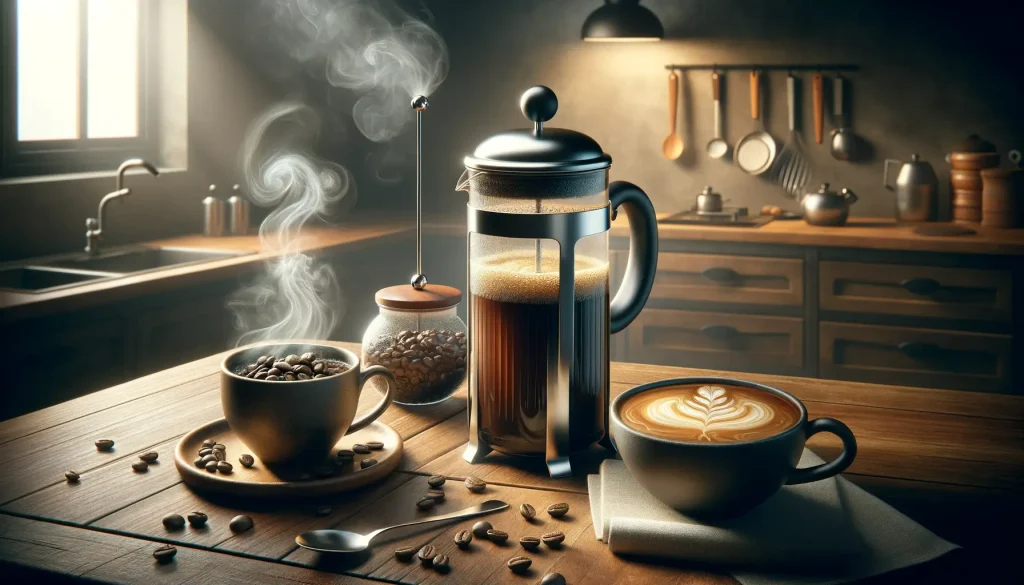
Ground Integration Technique
| Agitation Level | Effect | Tips |
| Too aggressive | • Clogs filter• Over extracts | • Stir gently in a swirling motion 1-2 times only • Avoid circular stirring |
| Too passive | • Prevents full extraction • Watery coffee | • Integrate within first 30 seconds • Ensure all grounds saturated |
- Aim to evenly saturate without creating a vortex near filter
- Swirling motion better blends water without pushing fines upward
- Time first swirl at initial pour or up to 30 seconds later
- Easy does it – 2 gentle agitations is plenty
6. French Press Plunger Not Working? Conquer Gentle Plunge Proficiency
Mastering a slow, steady plunger descent is imperative for bypass-free filtration.
Rushing this step often leads to the dreaded french press plunger not working scenario.
Plunge Proficiency
| Plunge Issue | Effect | Tips |
| Too fast | • Bypasses filter • Grounds in coffee | • Plunge slowly at 1 inch per 5 seconds • Use timer for pace consistency |
| Uneven pressure | • Channeling and bypass | • Keep level and apply light pressure • Don’t twist or wedge plunger |
- Target a pace of about 1 inch plunge every 5-10 seconds
- Apply light, even pressure across the entire plunger surface
- Resistance followed by ease indicates plunge completion
- Don’t force – if completely clogged, fully pull up plunger to restart
7. How to Fix French Press Filter Issues? – Mesh and Edge Quality
The filter screen on your French press is the last line of defense against grounds ruining your cup. Ensuring you have a high quality press with a sturdy filter is key for grit-free coffee.
Filter Fixes
| Filter Problem | Effect | Tips |
| Damaged mesh | • Allows grounds passage• Gritty coffee | • Inspect for holes or tearing • Replace filter screen if damaged |
| Loose edges | • Grounds bypass • Grit infiltration | • Check edge binding • How to fix french press filter: replace |
- Metal screens with double fine stainless steel mesh work best
- Replace press if mesh tears or edges come unbound
- Tightly woven screens should have no visible holes
- Avoid unfit plastic screens that can warp and wear
- Iconic French press coffee maker that brings out the full flavor and aroma of your brew.
- Secura stainless steel French Press coffee maker is made from top quality 18/10 stainless steel, both the interior and…
8. Clean Your French Press Thoroughly After Each Use
How you clean your French press after each use directly affects the taste of subsequent brews. Insufficient cleaning leads to stale, muddled flavors in future cups.
See our posts on the 9 Best Ways to Clean a French Press Easily and How do you deep clean a stainless steel French Press? for optimal methods.
Sanitation Methods
| Cleaning Approach | Effect | Tips |
| Incomplete cleaning | • Stale, funky flavors• Buildup on press | • Always clean after use• Use press-specific cleaners |
| Abrasive scrubs | • Alters stainless steel • Imparts metallic taste | • Avoid abrasive pads• Use soft brushes and sponges |
- Flavor compounds cling to residual oils and microscopic grounds
- Quick rinses fail to prevent rancid carryover issues
- Check seal for hidden buildup over time
- Deep clean regularly for maximum flavor
9. Water Purity – Critical for Extraction & Flavor
The quality of water used to brew coffee can greatly influence both extraction capability and final flavor. Poor tap water mutes aromatic compounds and introduces off tastes.
Water Considerations
| Water Issue | Effect | Tips |
| Hard water | • Reduces extraction• Bitter mineral taste | • Use filtered water • Add pinch of salt to soften |
| Chlorinated water | • Alters flavor • Health concerns | • Let tap water sit exposed overnight • Use bottled spring water |
- Water is the dominant ingredient – its purity directly impacts coffee
- Tap water flaws like chlorine, calcium, and metal influence brew
- Try allowing cold brewing if water taste overpowers hot cup
- Bottled spring or filtered water optimizes extraction and profile
10. French press coffee tastes too weak:
- Use more coffee grounds. Try increasing the amount of coffee by 1-2 tablespoons per 8 oz of water. This stronger ratio extracts more flavor.
- Grind your beans finer. Finer grounds have more surface area for hot water to extract oils and compounds. But don’t go too fine or the press filter may clog.
- Ensure your water is freshly boiled right before pouring. Water that is too cool won’t properly extract from the grounds. Heat it until bubbling rapidly and allow it to sit 45 seconds before pouring over your French press.
11. French press coffee is too strong:
- Use less coffee grounds. Reduce the amount by 1-2 tablespoons per 8 oz of water.
- Grind your coffee beans more coarsely. Larger grind pieces extract less flavor.
- Use cooler water around 175°F – 195°F. Lower temperature prevents overextraction.
- Steep the grounds for less time, 3-4 minutes only. Shorter brewing equals milder strength.
12. French press coffee tastes bitter:
- Use less coffee grounds per water. Reduce the amount by 1-2 tablespoons per 8 oz.
- Grind your beans more coarsely to extract fewer bitter compounds.
- Use cooler 185°F – 195°F water. Lower temp equals less intense extraction.
- Steep for less time, 3-4 minutes only. Shorter steeping prevents overextraction leading to bitterness.
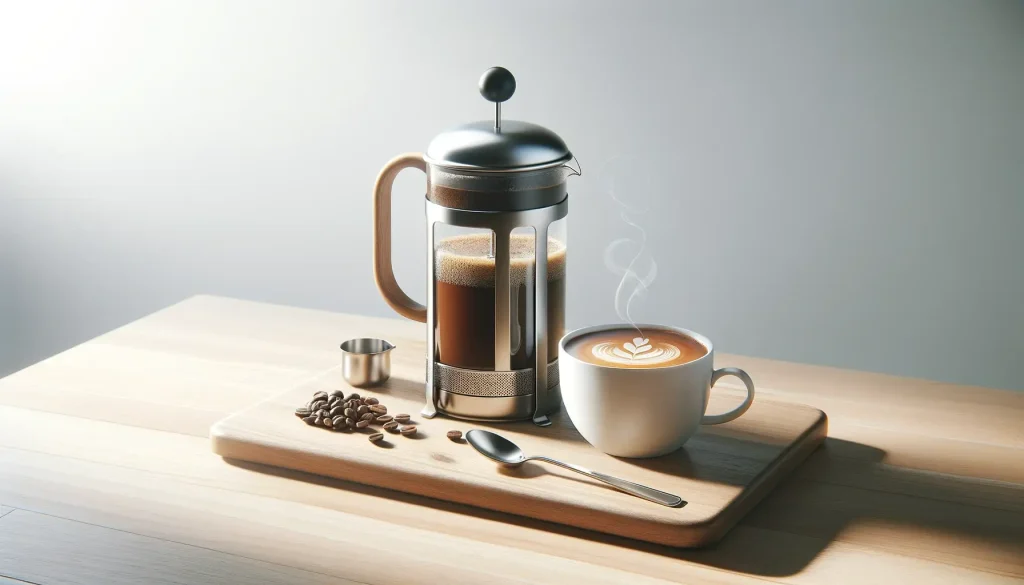
13. If your French press coffee is too sour:
- Use more coffee grounds per water. Add 1-2 tablespoons more per 8 oz to extract more.
- Grind the beans finer to increase contact surface area, but don’t powderize.
- Ensure water is freshly boiled right before pouring. High heat helps extract acids.
- Let the coffee brew for at least 4 full minutes. More time allows for proper extraction to reduce sourness.
- ENHANCED FLAVOR: This glass French press coffee maker ensures rich aroma extraction using a 4-level filtration system….
14. If Your French Press Coffee Has Too Much Sediment:
- Grind the beans smaller. When you grind the beans into little bits, make the bits really tiny. Small bits will not go through the filter into your coffee cup as much.
- Push the plunger down super slow. Lower the plunger very gently over 4 or 5 seconds. Going slow helps keep the bits trapped in the filter instead of rushing into your cup.
- Use a special filter. Some French presses have double filters. The double filter will catch more tiny coffee bits. This means your coffee will be clearer with less bits.
15. If your French Press Coffee is too Oily:
- Grind your beans more coarsely. The larger pieces won’t release as many coffee oils.
- Press the plunger down very slowly, over 45-60 seconds. Gentle pressure leaves behind more oils.
- Consider using a French press with a double stainless steel filter screen. The additional layer catches more coffee oils.
16. If your French Press Coffee is Turning Cold:
- Heat up your French press first by rinsing it with hot water. This keeps your coffee warmer for longer.
- Warm your mug before pouring in the coffee. Simply fill it with hot water, wait a bit, and then empty it.
- Enjoy your coffee as soon as it’s ready. The sooner you drink it, the warmer it’ll be.
17. What are some Tips for Making Flavored French Press Coffee?
Add Fresh Ingredients: Mix in cinnamon, vanilla beans, or citrus peels with your coffee grounds.
Use Spices: Experiment with cardamom, cloves, or star anise for a unique flavor.
Flavored Syrups or Extracts: After brewing, add vanilla, hazelnut, or caramel syrup for extra taste.
Cocoa for Mocha Flavor: Add a spoonful of cocoa powder to the grounds for a chocolate twist.
Adjust Brewing Time: Experiment with the brewing time when adding new flavors to get the right taste.
- Iconic French press coffee maker that brings out the full flavor and aroma of your brew.
18. French Press Coffee Tastes like Metal.
- Use a French press that is made from stainless steel.
- Wash your French press with warm, soapy water.
- Rinse your French press thoroughly with clean water.
19. French Press Coffee Tastes like Plastic
Switch to a French press made of glass. Glass doesn’t impart any flavors to your coffee.
Clean your French press with warm, soapy water. This helps remove any residues that might affect the taste.
Rinse your French press well with clean water to ensure no soap remains, as this can also impact the flavor.
20. French Press Coffee Tastes like Coffee Grounds:
- Grind your coffee finer. A finer grind will reduce the chances of grounds ending up in your cup.
- Press the plunger down slowly and evenly. This helps prevent the grounds from being pushed into the coffee.
- Consider using a French press with a double filter. It can better trap the coffee grounds, leaving your brew smoother.
21. French Press Coffee Tastes too Watery:
- Increase the amount of coffee grounds. Adding more will give a stronger flavor.
- Grind your coffee finer. Finer grounds extract more flavor, making the coffee richer.
- Use water that’s just stopped boiling. Hotter water extracts more flavor from the coffee.
- Let your coffee steep longer. A longer steeping time allows for more flavor extraction
22. French Press Coffee has a Chemical Taste:
- Use fresh, filtered water. This can help avoid any unwanted tastes from tap water.
- Clean your French press with warm, soapy water. This helps remove any residues that might be affecting the taste.
- Rinse your French press well with clean water to ensure no soap or cleaning agent remains, as these can contribute to a chemical taste.
23. French Press Coffee Tastes like Soap:
- Make sure to wash your French press more thoroughly. This helps remove any soap residue.
- Try a different brand of dish soap. Some soaps have stronger scents or leave more residue.
- Rinse your French press very well with clean water. Ensure all soap is completely washed out.
- ☕️ Sleek and stylish design: Our glass coffee press boasts an elegant and timeless design that will complement any…
24. French Press Coffee has a Chlorine Taste:
- Use fresh, filtered water. Filtering can remove chlorine and other impurities.
- Let your water sit out for some time before brewing. This allows chlorine to evaporate.
- Consider using a water filter. A good filter can effectively reduce chlorine taste and smell from your water.
25. French Press Coffee Tastes like Mildew:
- Wash your French press more frequently. Regular cleaning prevents mildew buildup.
- Dry your French press completely after each use. Moist environments can encourage mildew growth.
- Store your French press in a dry area. This helps to keep it free from moisture and mildew.
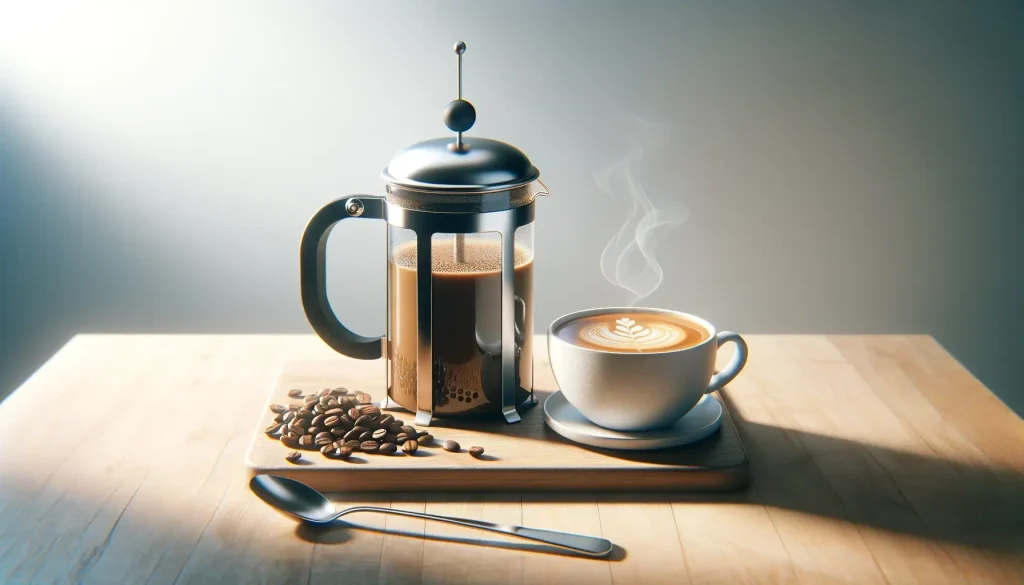
26. French Press Coffee Tastes Musty:
- Wash your French press more regularly. Keeping it clean helps prevent musty odors and tastes.
- Make sure to dry your French press thoroughly after washing. Any leftover moisture can lead to musty smells.
- Store your French press in a dry, well-ventilated area. This reduces the risk of mustiness developing.
27. French Press Coffee Tastes like Old Coffee:
To Improving the Taste of French Press Coffee, here are some in-depth tips to ensure a fresher and more flavorful brew:
- Use Fresh Coffee Beans:
- The freshness of your coffee beans is crucial. Fresh beans mean more flavor.
- Beans start to lose their freshness and aroma as soon as they are roasted. So, the fresher, the better.
- Purchase beans in smaller quantities to ensure you’re always using them at their freshest.
- Grind Coffee Just Before Brewing:
- Grinding coffee beans exposes more surface area to air, leading to quicker loss of flavor.
- By grinding beans right before brewing, you preserve their full flavor and aroma.
- This step is especially important for the French press, as it relies heavily on the coffee’s oils and aromas for its rich taste.
- Store Beans Properly:
- How you store your coffee beans affects their lifespan and taste.
- Keep them in an airtight container to protect them from air, moisture, and light.
- Avoid storing them in the fridge or freezer, as this can introduce moisture and other food odors.
- For more detailed advice on storing your coffee beans and grounds, check out our comprehensive guide here.
By following these steps, you can greatly improve the taste of your French press coffee, ensuring a fresh, rich cup every time.
28. French Press Coffee Tastes Burnt:
- Use water at a cooler temperature. Water that’s too hot can over-extract and burn the coffee.
- Grind your coffee more coarsely. Finer grinds can over-extract easily, leading to a burnt taste.
- Steep your coffee for a shorter time. Over-steeping can also cause a burnt flavor.
29. French Press Coffee isn’t Brewing at all, here are some Troubleshooting steps:
1. Check Coffee Grind Size: Ensure your coffee isn’t ground too coarsely. If the grounds are too large, water may pass through without proper extraction.
2. Inspect the Plunger and Filter: Make sure the plunger and filter are functioning correctly. A broken or improperly assembled filter won’t trap the grounds effectively.
3. Water Temperature: Verify that your water is hot enough. If it’s too cool, it won’t extract flavors efficiently from the coffee grounds.
4. Ratio of Coffee to Water: Ensure you’re using the right ratio of coffee to water. Too little coffee can result in weak or no brew.
5. Pre-wetting Grounds: Sometimes, pre-wetting the grounds before adding the rest of the water can help. Pour a little hot water, stir, and then add the rest.
6. Steep Time: Check your steeping time. If it’s too short, the coffee might not brew properly.
7. Quality of Coffee Beans: Old or stale coffee beans might not brew well. Ensure your coffee beans are fresh.
8. Clogged Filter: If your filter is clogged with old coffee grounds, it can prevent proper brewing. Clean the filter thoroughly.
If after these checks your French press still isn’t brewing, there might be an issue with the press itself, and it may need to be replaced.

